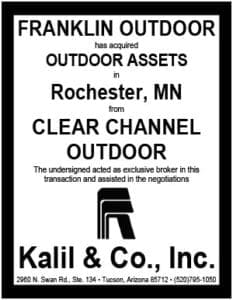 By Richard Rothfelder, Rothfelder and Falick
By Richard Rothfelder, Rothfelder and Falick
Introduction
On April 6, 2018, the Texas Supreme Court granted TxDOT’s Petition for Review and without hearing oral argument, issuing a formal opinion, or considering the merits of the case, vacated the judgments of the Court of Appeals and trial court (which ruled the Highway Beautification Act in violation of the First Amendment and therefore unconstitutional) and dismissed the case as moot. While the appeal was pending, the Texas Legislature amended the Highway Beatification Act. The Court apparently agreed with TXDOT’s argument that the newly amended HBA cured the First Amendment concerns addressed by the lower courts. The ruling from the Supreme Court effectively winds back the clock and nullifies the precedential effect of the decision in Auspro, which rendered TxDOT’s outdoor advertising rules unenforceable. However, the arguments asserted in the case remain viable and may be reasserted in a similar challenge to the former versions of the HBA and TxDOT’s outdoor advertising regulations.
Summary
In 2011, Auspro Enterprises, LP, placed a presidential campaign sign on its property on State Highway 71, west of Austin. The Texas Department of Transportation sent a letter to Auspro explaining that its sign was in violation of the Texas Highway Beautification Act because “all outdoor signs must be permitted and, although there is a specific exemption under Department rules for political signs, the exemption only allows political signs to be displayed 90 days before and 10 days after an election.” The Department ordered Auspro to remove the sign. Auspro did not remove the sign, and the Department brought an enforcement action. Auspro asserted that the Act and the Department’s rules violated its right to free speech under the First Amendment to the Constitution.
Relying heavily on the United States Supreme Court’s decision in Reed v. Town of Gilbert, Arizona, the Third Court of Appeals held in Auspro that “the Texas Highway Beautification Act’s outdoor-advertising regulations and related Department rules are, as written, unconstitutional ‘content-based’ regulations (as defined by Reed) of noncommercial speech because they do not pass strict-scrutiny analysis.” Speech regulation is content based if a law applies to particular speech because of the topic discussed or the idea or message expressed. Because content-based laws target speech based on its communicative content, they are presumptively unconstitutional and may be justified only if the government proves that they are narrowly tailored to serve compelling state interests. According to the Court of Appeals, the HBA and Department regulations applicable in Auspro failed this strict scrutiny analysis and could not be severed from the rest of the statute and regulations. Consequently, all sections of TxDOT’s regulations related to permitting under Chapter 21, Title 43 of the Administrative Code, as well as the HBA, were held unconstitutional.
Following the Auspro ruling, the Texas Legislature amended the Texas Highway Beautification Act. The primary change was the replacement of the term “off-premise sign” with “commercial sign.” In enacting these changes, Texas no longer distinguishes signs by reading the message displayed on the sign and determining whether the goods/services are located on or off the premise. Instead, the distinction is based on whether a fee is paid for the display of goods/services on the sign. In February 2018, the Texas Transportation Commission voted to adopt new administrative rules. These rules similarly replace “outdoor advertising” and “sign” with “commercial sign.”
The Texas Supreme Court appealed the decision in Auspro, arguing that the case was moot because of the amendment of the HBA during the pendency of the appeal. Auspro agreed. However, the issue before the Court was whether to let the decision of the lower courts stand, thus affirming the precedential effect of the Court of Appeals’ ruling, or vacate the decision of the lower courts and wipe away the ruling that the HBA and related Department rules are unconstitutional. On April 6, 2018, the Court chose the latter option, and without addressing the merits of the case, dismissed the case as moot and vacated the decisions of the lower courts.
Takeaways
The Supreme Court’s action leaves litigants with a clean slate to challenge the constitutionality of the former HBA and the enforceability of TxDOT’s corresponding outdoor advertising rules. To be clear, the Court did not decide that the decision in Auspro was incorrect, merely that it was no longer necessary to reach a decision on the merits (because the legislative amendments to the HBA cured any harm that the court may need to address). As a result, litigants may now assert the same First Amendment challenges upheld in Auspro, and may be successful in doing so in permitting cases based on TxDOT’s former rules and the former version of the HBA.
[wpforms id=”9787″]
Paid Advertisement

















